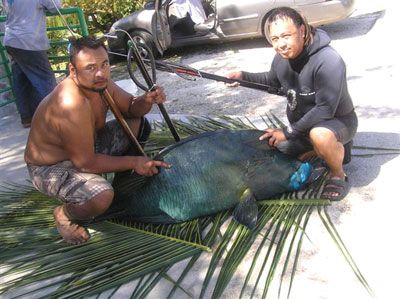関する記事がサイパンの新聞に出ていました。
★2008年1月25日のメイダイブのサイパン日記
→ http://www.meidive.com/saipandiary/2008/01/0125n.htm
★2008年2月5日のSAIPAN TRIBUNE(サイパンの新聞)の記事
→ http://www.saipantribune.com/newsstory.aspx?cat=1&newsID=76728
★英語が苦手の方のための無料翻訳ページ
→ http://www.excite.co.jp/world/
下記が本日付けの記事です。
 A
handful of community members have expressed outrage over the recent catch of two
Napoleon wrasses on Saipan but the diver who caught them said he didn't do
anything wrong.
A
handful of community members have expressed outrage over the recent catch of two
Napoleon wrasses on Saipan but the diver who caught them said he didn't do
anything wrong.
Merchant marine Capt. Carl Brachear said it is rather
sad that, although in many countries Napoleon wrasses are protected, that is not
the case in the CNMI.
“This is really sad, as they are so rare in the
world,” Brachear said.
Felix Sasamoto of the Division of Fish &
Wildlife caught the two Napoleon wrasses just two weeks ago.
“I don't
understand why these people are angry. I didn't do anything wrong. I didn't
break any law,” said Sasamoto, who maintained that he did not catch the fish at
marine sanctuaries.
Michael Trianni, DFW's Fishery Section supervisor
said, “As a free diver, Felix did not break any laws and has every right under
existing laws to harvest that or any other fish he is able to.”
Sasamoto
explained that catching the large fish has helped him pay for his bills and his
wife's medications.
“I want these people to know that the fish did not
go to waste. I work for the DFW, I would not do anything so stupid as to catch
something that is endangered,” he said.
The Napoleon wrasse, according
to Trianni, is not rare in the CNMI. “It has in fact been observed throughout
the CNMI and is not considered uncommon,” Trianni said.
“No one should
blame me for catching the fish. I will continue to catch them until it becomes
against the law for me to do so,” Sasamoto said.
Being a diver, he said
he knows for sure that the wrasses are not endangered in the CNMI. “I know a
place where many of them gather. If people really want to see them, I can take
them there. There are a lot of them!” exclaimed Sasamoto.
Brachear,
however, begs to differ. “One main reason why Japanese divers visit Saipan at
all is to swim with the wrasses,” he said.
“You don't see many Japanese
divers visiting Saipan anymore,” Brachear said. “Instead, many of them travel to
Guam because the wrasses are protected over there.”
In other countries,
the Napoleon wrasse is considered under threat from extinction as a direct
result of the lucrative demand for live Napoleon wrasse in Asia.
Divers
in the local community have shared that swimming alongside this fish is a
“priceless experience.”
The Napoleon wrasse is also known as a charming
fish because it is very friendly, often allowing divers to stroke it or when no
one is petting it, it has been known to gently nudge or brush up against a
diver.
Although the wrasse is long lived, it has a very slow breeding
rate. According to the International Union for Conservation of Nature and
Natural Resources, the numbers have declined due to a number of threats.
The threats have made it an endangered animal as it is not being
replaced fast enough to compensate for the excess fishing rate and other
threats.
The Napoleon wrasse is currently “red-listed” by the
IUCN-“meaning it is a species being adversely impacted by human activity and is
susceptible to becoming critically endangered or extinct,” according to marine
coordinator Genevieve Johnson.
“The major problem we have here is
overfishing. And some people just don't get it,” Brachear said.
Johnson
said, “If the current demand for the Napoleon wrasse by the live reef fish trade
is allowed to continue, we may soon lose a very special animal, one that is
capable of willfully associating with humans.”
Wealthy patrons in Hong
Kong, Singapore, and Taiwan have an insatiable appetite for the flesh of the
Napoleon wrasse. It is reportedly popular in these regions to advertise one's
wealth by paying upward of $1,500 to dine on a single fish, or up to $400 for a
set of the wrasse's lips.
The eating of the Napoleon wrasses is not
because of its superb taste, but because it serves as a status symbol, according
to Wikipedia.
The meat of this fish has become expensive because it has
been overfished and is a rare catch.
もどる